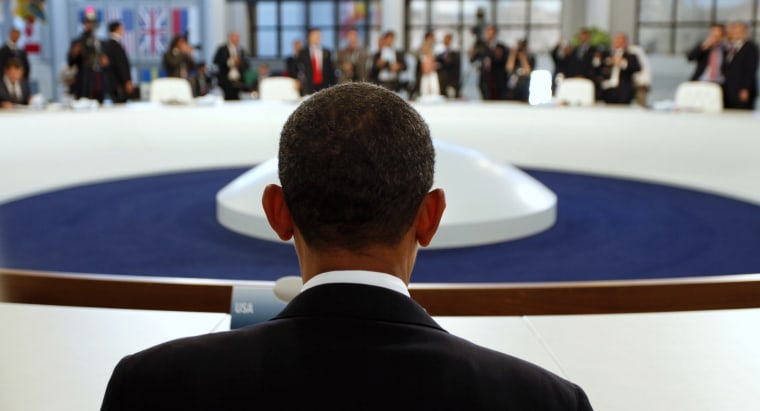President Barack Obama said Thursday the global recession makes it harder to strike an international agreement to battle dangerous temperature increases, but he urged the poor emerging economies that rejected specific clean-energy goals to "fight the temptation toward cynicism" and embrace them soon.
"There is no contradiction between environmentally sustainable growth and robust economic growth," Obama said at the conclusion of a forum of the world's 17 major economies, which account for about 80 percent of emissions of heat-trapping gases blamed for global warming. "We can either shape our future or we can let events shape it for us."
The Group of Eight nations — Britain, Canada, France, Germany, Italy, Japan, Russia and the United States — agreed at their summit in this central Italian town to a goal of cutting the world's greenhouse gas emissions in half by 2050, and emissions from their countries by 80 percent by then to help get there.
But developing nations, invited to join the summit of their wealthier industrialized counterparts to talk climate change, refused to sign on for specific emissions-reductions targets for their own countries.
No higher than 2 degreesThe rich and emerging nations also together declared for the first time that average global temperatures should not rise higher than 2 degrees Celsius above those of preindustrial times. But the leaders made no commitments to do anything in the near term, say by 2020, to reach that goal.
Obama, his goal of a sweeping new agreement between the developed and developing world on climate denied here, nonetheless portrayed the summit a success.
"While we don't expect to solve this problem in one meting, or one summit, I believe we've made some important strides forward," he said. "It is no small task for 17 leaders to bridge their differences on an issue like climate change."
He said the U.S. — with its "much larger carbon footprint per capita" — now means to lead by example.
"The United States has sometimes fallen short of meeting our responsibilities," Obama said. "Let me be clear, those days are over."
And he prodded others to follow.
"Today's problems are made by human beings," the president said. "That means it's within our capacity to solve them. The question is whether we have the will to do so."
Flicker of progress
But after almost six months on the job, Obama has seen but a flicker of progress toward his goal of an agreement among developed and developing nations to cap rising global temperatures.
His peers expressed appreciation for the United States' approach; Australian Prime Minister Kevin Rudd welcomed the return of U.S. leadership on the issue.
Yet when Obama thrust himself into this discussion, he ran into the same old problem: Neither the wealthy nor the countries in search of their own footing think the other side is doing enough. And only when the pollution emitters work together on a binding plan will a climate strategy work, experts say.
"It's even more difficult in the context of a global recession which I think adds to the fears that somehow addressing this issue will contradict the possibilities of robust global economic growth," Obama said.
Victory came with a setback
Even victory came with a setback Wednesday. The Group of Eight set a goal of cutting all greenhouse gas emissions in half by 2050, but developing nations refused to go along.
"We've made a good start, but I'm the first one to acknowledge that progress on this issue will not be easy," Obama said. "One of the things we're going to have to do is fight the temptation toward cynicism, to feel that the problem is so immense that somehow we cannot make significant strides."
Obama spent his day discussing climate and a host of economic issues, and the number of countries represented at the table will just keep growing.
First, the traditional industrialized powers will expand their forum to other strategic economies: Brazil, China, India, Mexico and South Africa, plus a special invitee, Egypt.
And Obama later will help lead a forum of major economies that also includes Australia, Indonesia and South Korea. Together, including the U.S., the represented countries account for about 80 percent of the emissions of the heat-trapping gases blamed for global warming.
The results this week provide a pivotal marker of what could happen in talks in December in Copenhagen, when the United Nations tries to conclude a new worldwide climate deal.
U.N. Secretary-General Ban Ki-Moon said the G-8 countries must come forward with financing for poorer nations to change their carbon-heavy growth patterns and adapt to the effects of global warming. He said the G-8 must do both if developing countries are to cut their own emissions.
Temps should be kept from rising
The two blocs — the richest countries and the fastest growing ones — did strike an important agreement Wednesday. Their unified position now is that global temperature should be kept from rising by more than 3.6 degrees Fahrenheit (2 degrees Celsius).
That's the point at which the Earth's climate system would fall into perilous instability, according to the United Nations' chief panel on climate change.
Obama began his agenda Thursday by meeting with Brazil's president, Luiz Inacio Lula da Silva, to discuss climate change, Iran and other issues. White House spokesman Robert Gibbs said Silva gave no ground on the greenhouse gas-reduction question.
The Silva meeting was a late addition. It came during the slot when Obama was to have met with Chinese President Hu Jintao, who returned home to deal with an outbreak of ethnic violence.
Hu's departure is seen by analysts as weakening the chances that the U.S. and other G-8 countries can advance climate talks at this summit with China and a few of its close peers.
More on: |
